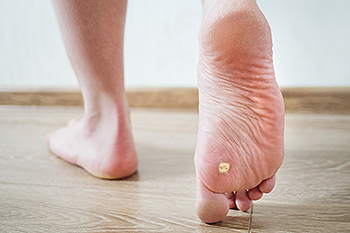What Is a Plantar Wart Caused By?
Tuesday, 24 January 2023 00:00
Warts are growths that can form on various parts of the body. Plantar warts develop on the soles of the feet and grow inward as a result of the weight the feet endure. They generally cause severe pain and discomfort, and walking may become difficult. A wart is caused by the human papillomavirus (HPV), and plantar warts are no different. They can have the appearance of a callus, with small black dots in the center. This particular virus lives and thrives in warm and moist environments, including shower room floors and public swimming pools. It can enter the body through small cuts in the skin on the feet, and it is beneficial to wear appropriate shoes while in these areas. Additional preventive methods consist of keeping the feet as dry as possible, and refraining from sharing towels, shoes, and socks. There are various treatments that can be effective, and it is advised that you consult with a podiatrist who can determine what the best one is for you.
Plantar warts can be very uncomfortable. If you need your feet checked, contact one of our podiatrists from Port Richmond Family Footcare. Our doctors will assist you with all of your foot and ankle needs.
About Plantar Warts
Plantar warts are the result of HPV, or human papillomavirus, getting into open wounds on the feet. They are mostly found on the heels or balls of the feet.
While plantar warts are generally harmless, those experiencing excessive pain or those suffering from diabetes or a compromised immune system require immediate medical care. Plantar warts are easily diagnosed, usually through scraping off a bit of rough skin or by getting a biopsy.
Symptoms
- Lesions on the bottom of your feet, usually rough and grainy
- Hard or thick callused spots
- Wart seeds, which are small clotted blood vessels that look like little black spots
- Pain, discomfort, or tenderness of your feet when walking or standing
Treatment
- Freezing
- Electric tool removal
- Laser Treatment
- Topical Creams (prescription only)
- Over-the-counter medications
To help prevent developing plantar warts, avoid walking barefoot over abrasive surfaces that can cause cuts or wounds for HPV to get into. Avoiding direct contact with other warts, as well as not picking or rubbing existing warts, can help prevent the further spread of plantar warts. However, if you think you have developed plantar warts, speak to your podiatrist. He or she can diagnose the warts on your feet and recommend the appropriate treatment options.
If you have any questions please feel free to contact our office located in Lumberton, NJ, . We offer the newest diagnostic and treatment technologies for all your foot and ankle needs.




